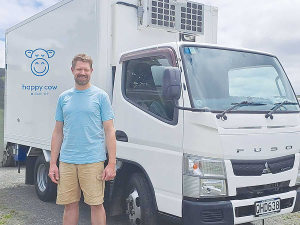Milk factory 'in a box'
A pioneer in small, local, low environmental-footprint milk supply hopes to have his "milk factory in a box" up and running and selling milk to the public by early November.
 Glen Herud’s Happy Cow brand now exists as a ‘factory in a box’ pasteurisation and refrigeration plant. Photo Credit: Happy Cow Facebook Page.
Glen Herud’s Happy Cow brand now exists as a ‘factory in a box’ pasteurisation and refrigeration plant. Photo Credit: Happy Cow Facebook Page.
A Canterbury man who has been working for several years to establish what he calls "a more caring, kinder and fairer" dairy system is now up and running in the North Island after establishing a partnership with a Waikato dairy farm.
Glen Herud's Happy Cow brand has gone through several iterations but now exists as a 'factory in a box' pasteurisation and refrigeration plant, supplying Auckland consumers by way of about a dozen collection points dotted around cafes, convenience stores and the like.
The plant is installed on a Te Kauwhata dairy farm where the farmer has devoted a small number of cows from his main herd to supplying Herud's system.
"You can only buy our milk online through our website. And then we drop it off at several collection points about Auckland and people just go and pick up their milk. And then their credit card is charged," explains Herud.
"We're not going through retailers or anything like that."
Herud says it is not just about how the cows and calves are treated but the partner farmers have to be customer-focused.
"A lot of farmers just want to produce the milk and have it taken away.
"When you start selling milk direct you must start producing really good quality milk and whatever Fonterra calls good quality is still not really what we call good quality. There's a little bit of extra work involved."
Herud says his partner is a sharemilker who is "pretty onboard with what we are doing".
"We'll take more and more as we grow but we'll probably only ever take 50% of their milk."
Herud first featured in the pages of Dairy News in 2016 when he was milking his own small herd near Christchurch using a 15-metre custom trailer housing a milking machine, pasteuriser and bottling plant, and serving a small customer base including cafes and supermarkets. He also won an environmental award for the way the mobile plant could be taken to where the cows graze, to minimise pugging.
His philosophy also includes animal welfare priorities such as leaving calves with their mothers to wean naturally.
By 2018, however, he had to concede that it was too expensive to operate at small scale and moved to develop his factory-in-a-box model for installation on partner farms.
Herud says he is now building an improved second prototype and hoping to find a Canterbury partner farm.
"We will be back down to Christchurch shortly. That's the plan."
One of the country's top Māori farms faces a long and costly rebuild to get the property back to where it was before recent storms ripped through it.
The latest Global Dairy Trade auction results have delivered a boost to dairy farmers.
New Zealand potato growers are prioritising value creation from high yields to meet a complex mix of challenges and opportunities, says Potatoes NZ chief executive Kate Trufitt.
A Hawke's Bay apple orchardist supports the Government's objective of doubling exports but says this won't happen in the horticulture sector unless there's a change in the process for bringing new plant material into the country.
Canterbury arable farmers are down by tens of millions of dollars after a rollercoaster of wild changeable January weather saw harvests delayed and some crops destroyed by violent hailstorms.
Could a breakthrough in fermentation create a new multi-million-dollar export market for shiitake mushroom extracts into China?
OPINION: Fonterra may be on the verge of selling its consumer business in New Zealand, but the co-operative is not…
OPINION: What does the birth rate in China have to do with stock trading? Just ask a2 Milk Company.